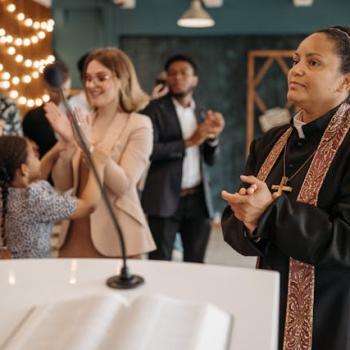The term “The Ministry of Ordination” sounds very serious and official. I have titled such on purpose, for that very reason: ordination is a crux of ministry. It is both a beginning of ministry and the receipt of ministry, at once. When one goes into ministry, they are at the beginning of their service (the word ministry means “service”) as an individual and are receiving the benefit of service from a spiritual leader. It reflects a number of different ideas come together, all of which are both profoundly spiritual and practical to equip at the same time. For most people who go through the proper process, ordination comes after long periods of discernment and training.
You probably know someone who is ordained; maybe you desire ordination for yourself. Regardless of its popularity, ordination is frequently misunderstood. Some see ordination as a means to obtain an end (such as doing a friend’s wedding), some think it is an unnecessary concept, and others see it as a spiritual practice. Who is right? In those various options, is anyone wrong? Here, we will briefly examine ordination so everyone can understand why it is so vital to the life of the church.

What is ordination?
In my book, Celebrating the Sacred in Ministry: The Rites, Rituals, Ordinances, and Prayers and Blessings of the Church, I define ordination as:
“Ordination is the Biblical rite by which leaders are commissioned and purposed for ministry. The term “ordination” is used to indicate a leader’s call is ordered of God and that their steps in ministry are ordered of God. True ordination confirms what God has put into place within a person’s life, celebrates it, acknowledges it, and provides legal documentation of it. Overall, ordination is the celebration of God’s call to leadership in one’s life.” (pg. 7)
From this definition, we can understand a few things:
- Ordination is part of church leadership (done for and by church leaders)
- It acknowledges those called to church leadership
- Such is called “ordination” because it acknowledges someone’s call is ordered of God and their steps in ministry are also ordered of God
- It confirms what God is doing in someone’s life
- Ordination is a legal process as much as it is a spiritual one
- Ceremonies for ordination are public services
A rite – not a right
What I am about to say may be controversial, but it is a fact. No church member has the right to ordination from a denomination, ministry, or leader. Ordination is not an entitlement and it is not a rite of the church open to every member. As said above, ordination is for church leaders by church leaders. Ordination exists to confirm the call of church leaders. Receiving the rite of ordination is a sacred thing, a holy process. As one participates in it, they are both acknowledging their own call and their call is acknowledged by those in leadership over them. To be ordained within Christian rite, an individual must not only have an idea of servant leadership, they must show aptitude in it.
Leadership and ordination
When one receives the rite of ordination, they assume a leadership role within the church. What that leadership role is may vary. Some individuals are ordained and go on to lead international ministries; some work in local churches or outreach works; most leaders often do something that falls somewhere in between the two. For an individual to be ordained, they must be prepared for whatever ministry work they seek to do unto the Lord. It is this preparation that is perhaps more important than any other step in the ordination process.
Ordination happens by relationship through process. Every church or ministry organization with the legal right to officiate ordinations has the responsibility to establish proper criteria surrounding ordination. Most organizations do have programs in place. They combine special classes or ministerial training for completion during a discernment period. This discernment period is typically at least a year in length (many are longer and rely on how well a potential minister is known within their church community) and usually involves a few key steps:
- Discussion with a spiritual leader
- Meeting with a church or ministry board of elders
- Presentation of ministry aptitude and attitude
- Training
- Required service (we shall discuss this next)
Great followers make great leaders
When I came up in ministry, wanting to be in ministry leadership was a big deal. Such a big deal, in fact, that when we said we thought we were called, we weren’t put in the pulpit right away. It might have been months or years before we saw the pulpit! Typical first assignments for people discerning a ministry call were things like stacking chairs after service, cleaning the church bathrooms, assisting in altar work, helping with Sunday school, or somehow assisting the leader of the church. This probably doesn’t sound very glamorous; that’s because it’s not. Our leaders wanted us to understand that ministry service wasn’t as simple as getting attention while in the pulpit. It’s just as important – if not more so – for future ministers to realize the amount of work that goes into ministry.
Following the ministry of ordination
Good leaders want future leaders to learn something very important: a desire to do ministry isn’t enough to make it work. There are many people in this world who had great ideas and visions but no discipline to execute them. The work of ministry comes about by divine process, a work that is slow and paced, and requires patience. When we desire ordination, we acknowledge the process of God is greater than ours, and it is in that place that we discover spiritual order. Ordination is an act of this order; it reflects divine order. To be a good minister, one must first be a good disciple. We learn to be good leaders by being good followers; by submitting ourselves before God and our leaders in Christian humility. There is no “running ahead” or rushing the process.
In 1 Corinthians 11:1, the Apostle Paul says:
Pattern yourselves after me [follow my example], as I imitate and follow Christ (the Messiah). (AMPC)
The best leaders have learned by the example and training of their leaders, who follow them as they follow Christ. Ultimately, all Christian ministers follow Christ because they’ve learned how to follow – how to submit themselves – for proper service.
Relationship in ministry and ordination
Relationship is a sticky topic among Christians. Nobody likes being told what to do (which is often associated with relationship). We like being fed the lie that it’s “just me and Jesus” and that we don’t need others on our journey. Let’s get one thing straight: God saves us and places us in a Body, His church. While no one questions your right to have a relationship with God, that’s not all being a Christian is about. A lot of this walk is about learning to get along with others and find valuable purpose in community. That’s why God provides spiritual gifts, and it’s also why He calls some of us to serve as leaders. A call to leadership – and ultimately, receiving the ministry of ordination – is about the relationship one has with the Christian community. “Just me and Jesus” does not exist in legitimate ministry.
The importance of connection
Ordination is a rite that both acknowledges and confers; it confirms what God has and is doing within an individual and gives that individual the ability to do it. A leader or leadership council recognizes leadership gifts. As Christians, we are all connected; ordination is a thread that runs between different organizations, providing validity to leaders. Ordination legitimizes one’s call, establishing one as a leader in some capacity. It is disrespectful to expect ordination when you have no relationship with an appropriate ministry or church organization, because it expects that someone should extend their reputation and validation with no evidence.
And Jesus increased in wisdom (in broad and full understanding) and in stature and years, and in favor with God and man. (Luke 2:52, AMPC)
Even Jesus went through a period of process and discernment before beginning His ministry. As much as we recognize Jesus’ divinity in His call, there was also a human acknowledgement, as well. Jesus didn’t just randomly start doing things; He grew and He gained favor, positioning Himself to do a greater work in the appointed time. We, too will do what God has appointed for us to do if we are willing to wait out spiritual processes and develop essential relationships that bring favor to our work.
Avoiding haste in the ministry of ordination
When I was first ordained as an apostle, there was great pressure for leaders to produce other leaders. (It is a misnomer that such is a leader’s job; the leader’s job is to lead, acknowledging the abilities different individuals have while encouraging each person to pursue the call of God on their own lives.) The result was a frenzied chaos to “prove” we were superior ministers by performing as many ordinations as possible. The result was what you expect: burnt-out leaders over organizations full of under-trained, spoiled ministers. Lacking the right preparation and discernment periods, we had to pull many papers (remove people’s ordination status). It was hard to watch ministries fall…especially when such could have been prevented.
Do not be in a hurry in the laying on of hands [giving the sanction of the church too hastily in reinstating expelled offenders or in ordination in questionable cases], nor share or participate in another man’s sins; keep yourself pure. (1 Timothy 5:22, AMPC)
Leaders should never be in a hurry to ordain individuals. There should never pressure in this process. Ordination is not for bragging rights or performing a friend’s wedding. Rather, one should build connections essential for ministry, as one prepares. I’ve found that post-ordination, new leaders often need their leadership more than prior. If we build relationship, foundations are present for future need.
What one does with ministry ordination credentials
Validly licensed and ordained ministers have “credentials.” Credentialing can be a complicated topic; what and how a minister is credentialed varies among organizations, but there are a few things that are universal:
- The right to preach the Gospel, as one has opportunity
- Preside at weddings and funerals
- Perform baptisms
- Lead the rite of Holy Communion
- Assist during ordinations
Certain leaders also have the ability to perform ordinations. Rank determines who does such; for example, bishops, apostles, or prophets perform ordinations. Other offices, no less important, focus on different works, such as those mentioned above.
Much ado about credentials
A minister is “credentialed” when they receive the rite of ordination. Ordination must contain the laying on of hands by another validly credentialed minister, and the public presentation of the minister’s license and ordination certifications. A minister’s license declares the ministry office or purpose one holds, while an ordination certificate recognizes the work one will do in ministry. License and ordination certificates are signed by at least two individuals: one presiding over the ceremony and another(s) from the same group. Certificates contain a raised seal, issued by the legally valid organization performing the ceremony. There are a number of variations on ordination depending on denomination, organization, and ministry call or office, but all contain the two elements of laying on of hands and certificate presentation.
The ordination process
Many organizations ordain individuals in stages. First ordinations issue “first papers.” Such involves a candidate delivering their first public sermon. They are then credentialed to preach, perform baptisms, lead communion, and preside at weddings and funerals. Then, they assume a leadership role in their local church, now called “minister.” They may also train for or engage in work as a deacon or elder. Some desire to train for a different leadership position, and continue training while leading in a local church.
As a result, minister’s credentials vary depending on the specifications of one’s ordination. Not every minister has the ability to perform other ordinations, for example. Other credentials may also vary, especially among denominations. If there is question about what a minister can do, the best thing to do is check their license and ordination certificates. On at least one of those (usually the ordination certificate), there should be a list of things a credentialed minister is able to do.
A word about ministry ordination credentials
It might seem like an easy fix, but I caution aspiring ministers pursuing credentials through “ordination mills.” Such organizations are often online and issue credentials to anyone, for any reason. Ordination mill credentials are not considered legitimate in all locations. Reasons vary, but the major one is due to concerns of legitimacy. Those who receive such credentialing also receive no public service, which eliminates essential criteria (laying on of hands and presentation of certificates) from such a practice. The bottom line? Don’t try to skip steps. Leadership preparation is a must for the ordination process.
Also, it’s important to note that credentials don’t typically transfer between religious organizations. Ordination credentials vary in acceptance across denominations and religious groups. While the idea of ordination is somewhat universal, not every group acknowledges every other group’s process or criteria. The same is true with ordination training, education, and seminary requirements.
For more information about ordination, check out Ordination: Ordered Steps on the Kingdom Now podcast.














